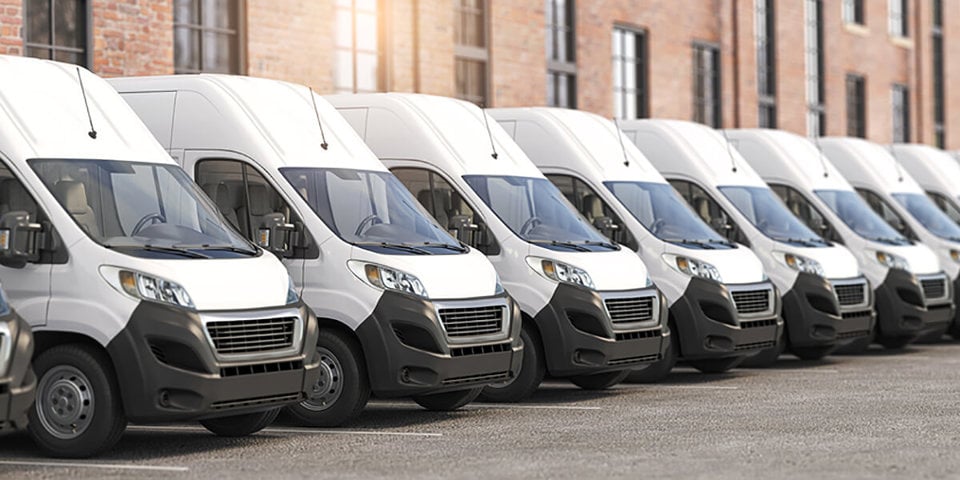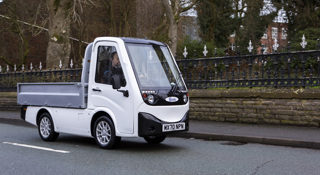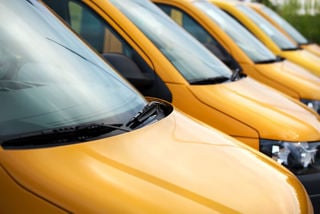A new report, from the Urban Transport Group, is calling for sustained support for urban freight at a local and national level to encourage modal shift to rail and water, decarbonise road freight and improve road safety.
The report, Delivering a greener future, highlights how freight is vital to the effective functioning of the UK economy, bringing great economic and employment benefits, and ensuring access to goods when and where they are needed – largely in cities.
But it notes that road freight – which currently accounts for almost 80% of goods moved in Great Britain - also brings many negative impacts for cities, such as carbon emissions, air pollution, congestion, damage to highway infrastructure and noise, and threatens road safety.
For example, Clare Linton policy and research advisor at the Urban Transport Group, highlighted the role that commercial fleets played in delivering the successful rollout of the Covid-19 vaccination programme.
“Up and down the UK, our city regions rely on the smooth movement of goods to keep hospitals and vaccination centres supplied with medicine and other equipment, ensure supermarket shelves are adequately stocked, and to deliver other materials and products that support thriving urban communities,” she said.
The pandemic, Linton argues, has served to further highlight the essential role that freight plays in the functioning of people’s everyday lives and the UK economy - the freight sector contributes some £86.5 billion annually.
However, she added: “The current dominance of road freight using largely fossil fuelled vehicles, is a cause for concern.
“These vehicles produce many negative impacts for our towns and cities, from road danger to air pollution and carbon emissions, and from damage to highways and noise.
“The growth of e-commerce, which accelerated during the pandemic, exacerbates these issues, increasing van traffic on urban roads.”
Road freight traffic makes a significant contribution to carbon dioxide emissions and air pollution. In 2019, transport accounted for 27% of the UK’s domestic greenhouse gas emissions, making it the largest emitting sector. Of this, 16% was from heavy goods vehicles (HGVs) and 16% from light goods vehicles (LGVs).
The report draws attention to innovations that are making freight operations safer, more sustainable, quieter and more efficient, such as the conversion of passenger trains to support high speed parcel delivery to city centres; the use of riverboat services to deliver medical supplies to the NHS in London; and zero emission vehicles in local authority fleets.
Ultimately, the report calls for sustained support for urban freight at a local and national level to encourage modal shift to rail and water, decarbonise road freight and improve road safety.
Laura Shoaf, chair of the Urban Transport Group, and chief executive at the West Midlands Combined Authority, said: “Our report finds that freight has a role to play in decarbonised urban areas, and can contribute to shaping cities that people want to be part of.
"But for that to happen we must deliver improvements in environmental and safety aspects and become more efficient and smarter – especially as local and transport authorities - in how we move and coordinate the movement of freight in our city regions. This must be underpinned by national support.”
The report states: “The way in which goods are delivered has the potential for both positive and negative impacts on the places that people live, work and spend time in.
“To maximise the positives and minimise the negatives, we need to make the greening of urban freight and logistics central to wider national and urban decarbonisation strategies and to make freight work for cities in a way that is safe, smart, clean and good for local economies, the environment and communities.”
The report recommends:
• Investing in infrastructure for modal shift: encouraging freight into urban areas by rail or water wherever possible; creating a more extensive network of rail and water-connected distribution sites; exploring other distribution hub formats beyond rail and water; and by consolidating orders through consolidation centres.
• Incentivising modal shift by reviewing the fiscal regime for road haulage to ensure it covers more of its indirect and direct costs and which incentivises safer and greener operation, and thereby improving the competitive position of rail and water. A more interventionist approach to rail freight is also required to incentivise the rail sector to widen the scope and extent of its services.
• Greening urban freight: with national Government developing a clear plan for delivering zero emission HGVs and the infrastructure necessary to support them, and local government and the wider public sector decarbonising its own fleets. Cycle logistics infrastructure should also be supported and expanded.
• Improving the safety of urban freight: by reviewing the regime for road safety that reflects the disproportionate impact of goods vehicles, through a new UK road safety strategy which will help to deliver on targets for collision reduction; and to set and enforce vehicle standards at the national level.
Linton said: “We need to in invest in infrastructure that allows modal shift. More freight can only be brought into cities by rail and water if we expand our network of rail and water-connected distribution sites, explore other distribution hub formats beyond rail and water, and by consolidating orders through consolidation centres.
“Second, we need to incentivise modal shift by reviewing the fiscal regime for road haulage to ensure it covers more of its indirect and direct costs and which encourages safer and greener operation, and thereby improving the competitive position of rail and water.
“Next - in addition to phasing out new non-zero emission HGVs by 2040, national Government should develop a clear plan for delivering these zero emission HGVs and the infrastructure necessary to support them.
“Local government and the wider public sector must work to decarbonise its own fleets, and cycle logistics infrastructure should also be supported and expanded.
“Finally, the safety of urban freight must be improved. This would involve reviewing the regime for road safety, recognising the disproportionate impact of goods vehicles, through a new UK road safety strategy which will help to deliver on targets for collision reduction, as well as setting and enforcing vehicle standards at the national level.”
The Delivering a greener future - Urban freight and the decarbonisation of the city regions report builds on and updates the 2015 report Delivering the future – New approaches to urban freight, which presented a vision for safe, smart and clean urban freight.
The Urban Transport Group has revisited the topic because in 2021 the challenges and opportunities that freight presents to city regions remain and have become even more pressing.
























Login to comment
Comments
No comments have been made yet.